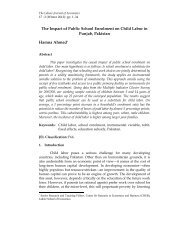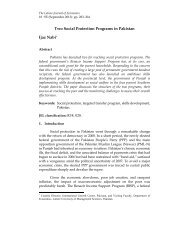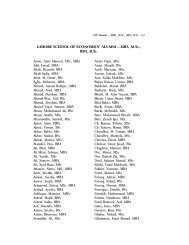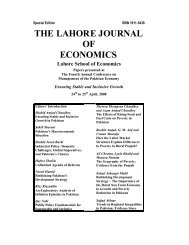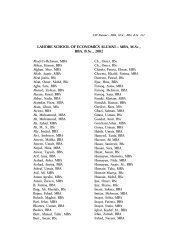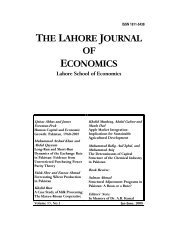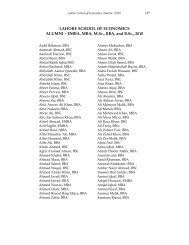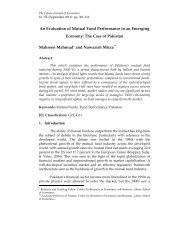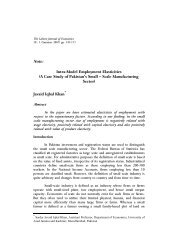Special Edition-07.pdf - Lahore School of Economics
Special Edition-07.pdf - Lahore School of Economics
Special Edition-07.pdf - Lahore School of Economics
Create successful ePaper yourself
Turn your PDF publications into a flip-book with our unique Google optimized e-Paper software.
Reforming the Government in Pakistan: Rationale, Principles & Proposed Approach 13<br />
interaction between the ordinary citizen and administrative machinery <strong>of</strong> the<br />
government is most intense. These four areas are:<br />
1. Police and Enforcement <strong>of</strong> Laws.<br />
2. Land Revenue Administration<br />
3. Education<br />
4. Health<br />
The Commission has formed four sub-committees to review and<br />
examine the efforts being made by the government, private sector and civil<br />
society in each <strong>of</strong> these areas and come up with solutions that will make the<br />
existing system more efficient and responsive to the needs <strong>of</strong> the public in<br />
the immediate or short run. The Commission has also formed another subcommittee<br />
to recommend revision in the Rules <strong>of</strong> Business for removing<br />
impediments in the functioning <strong>of</strong> the government departments/ministries/<br />
agencies and empowering the heads <strong>of</strong> the departments to deliver results.<br />
The preliminary recommendations <strong>of</strong> the sub-committees will be<br />
presented to focus groups <strong>of</strong> stakeholders drawn from diverse segments <strong>of</strong><br />
society – secretaries, committees, political leaders, businessmen, NGOs,<br />
academically refined civil servants, etc. – to solicit their feedback and views.<br />
Once this feedback is incorporated, the sub-committees will finalize their<br />
recommendations which will then be discussed by the Commission and then<br />
presented for consideration and decisions by the Steering Committee. The<br />
high powered Steering Committee is co-chaired by the President and Prime<br />
Minister and consists <strong>of</strong> the four Chief Ministers. The Committee has<br />
decided to provide a legal cover to the Commission so that the<br />
recommendations approved by the Steering Committee are implemented by<br />
the Federal and Provincial governments without further reviews.<br />
The Commission will also act as a facilitator and conduit for the<br />
reforms formulated by the Federal Ministries/Provincial Governments and<br />
table them, after its own analysis for the decisions by the Steering<br />
Committee.<br />
To conclude, those who agree that there is a need for these<br />
reforms have serious reservations about their implementation. They<br />
contend that these reforms cannot be implemented in the real sense<br />
unless we insulate bureaucratic actions from political interference.<br />
According to this school <strong>of</strong> thought, the problem <strong>of</strong> maladministration



